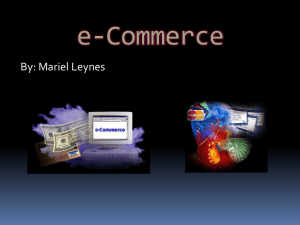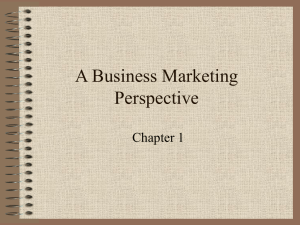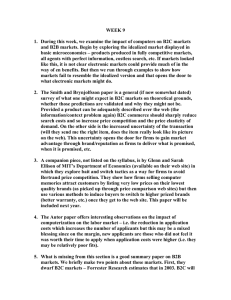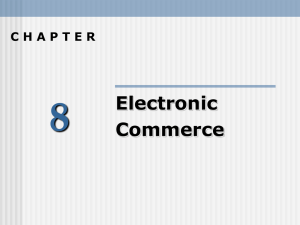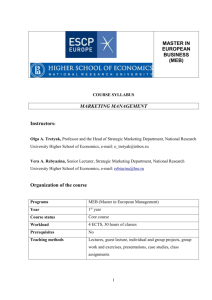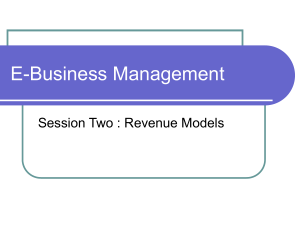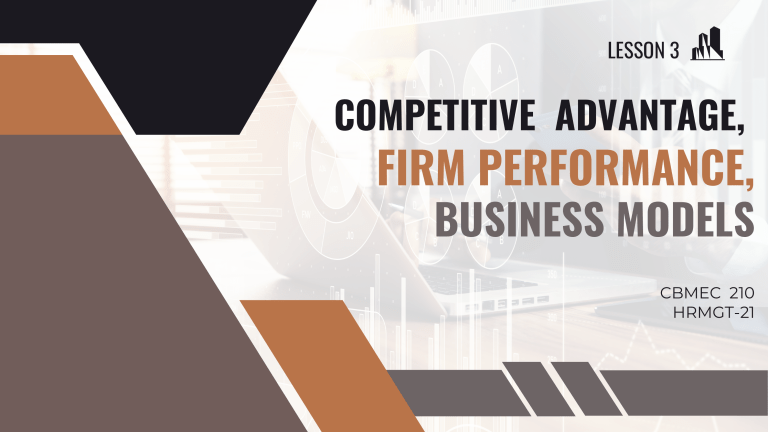
LESSON 3 COMPETITIVE ADVANTAGE, FIRM PERFORMANCE, BUSINESS MODELS CBMEC 210 HRMGT-21 Meet Our Team JULIE ANN SAPIA-AN Group Leader DENISE JULIA SALEM Member XENA MICHAELLA CABANIG Member Meet Our Team VANESSA POSTRERO Member KENNY CURATO ANDREW JUARIO Member Member THERESE ELAINE JOSOL Member Lesson Objectives LEARN HOW TO ASSESS AND EVALUATE COMPETITIVE ADVANTAGE ENABLE TO KNOW WHAT IS FIRM PERFORMANCE AND HOW TO MEASURE IT. TO LEARN THE DIFFERENT KINDS OF BUSINESS MODELS. COMPETITIVE ADVANTAGE WHAT IS COMPETITIVE ADVANTAGE? Competitive advantage refers to factors that allow a company to produce goods or services better or more cheaply than its rivals. WHAT IS COMPETITIVE ADVANTAGE? These factors allow the productive entity to generate more sales or superior margins compared to its market rivals. COMPETITIVE ADVANTAGE & FIRM PERFORMANCE 80% 70% To measure competitive advantage, we must : 60% 50% Assess firm performance and Benchmark to the industry average / other competitors EXAMPLES ASSESSING COMPETITVE ADVANTAGE NIKE WHAT MAKES NIKE DIFFERENT THAN IT'S OTHER COMPETITORS? McDonald's CHEAP PRICES IS MCDONALD'S MAIN COMPETITIVE ADVANTAGE. IMPORTANCE The purpose of having a competitive advantage is to distinguish a company from its competitors by offering something different and of superior value to its customers. Competitive advantage also means the business can outperform its competition in the market and make a higher profit. FIRM PERFORMANCE WHAT IS FIRM PERFORMANCE? According to Taouab & Issor, 2019. Firm performance is the capability of a business to effectively use its resources in such a way to generate operational and financial results. WHAT IS FIRM PERFORMANCE? The power of a business to implement activities better rather than its competitors. ACCOUNTING PROFITABILITY What is the firm's accounting profitability? SHAREHOLDER VALUE CREATION Three Traditional Frameworks to Assess Firm Performance How much shareholder value does the firm create? ECONOMIC VALUE CREATION How much economic value does the firm generate? ACCOUNTING PROFITABILITY -HELPS ASSESS COMPETITIVE ADVANTAGE -USES STANDARD, PUBLICLY AVAILABLE METRICS -PROFITABILITY RATIOS SHAREHOLDER VALUE CREATION Shareholder value is created when a company's profits exceed its costs. Stock prices can be highly volatile, making it difficult to assess firm performance, particularly in the short term. Text 02 Description Overall macroeconomic factors such as the unemployment rate, economic growth or contraction, and interest and exchange rates all have a direct bearing on stock prices. ECONOMIC VALUE CREATION A firm has a competitive advantage when it creates more economic value than rival firms. Economic value creation is the difference between a buyer’s willingness to pay for a product/service and the firm’s total cost to produce it: (V – C), where (V) = Value and (C) = Cost, also called economic contributionThe amount of total perceived consumer benefits equals the maximum willingness to pay. IMPORTANCE It helps you identify areas that need to be improved before they become major issues, as well as giving you the opportunity to consider how to respond. The following methods can help you assess your business performance. BUSINESS MODELS WHAT IS BUSINESS MODELS? THE TERM BUSINESS MODEL REFERS TO A COMPANY'S PLAN FOR MAKING A PROFIT. IT IDENTIFIES THE PRODUCTS OR SERVICES THE BUSINESS PLANS TO SELL, ITS IDENTIFIED TARGET MARKET, AND ANY ANTICIPATED EXPENSES. 1. BUSINESS -TO- BUSINESS MODELS (B2B): 2. BUSINESS -TO-CONSUMER MODELS (B2C): 3. SUBSCRIPTION BASED MODELS: Main Types of Business Models 4. CUSTOMER-BUSINESS MODEL (C2B) 1. BUSINESS -TO- BUSINESS MODELS (B2B): When the dealings or the transactions take place between two companies or the business then this type of business model is known as business to business models. IN OTHER WORDS, IT IS SIMPLY A BUSINESS SELLING TO OR SUPPLYING ANOTHER BUSINESS. 1. BUSINESS -TO- BUSINESS MODELS (B2B): Business-to-business (B2B), also called B-to-B, is a form of transaction between businesses, such as one involving a manufacturer and wholesaler, or a wholesaler and a retailer. Business-to-business refers to business that is conducted between companies, rather than between a company and individual consumer. EXAMPLE 1. BUSINESS -TO- BUSINESS MODELS (B2B): Samsung, for example, is one of Apple's largest suppliers in the production of the iPhone. Apple also holds B2B relationships with firms like Intel, Panasonic and semiconductor producer Micron Technology. 2. BUSINESS -TO-CONSUMER MODELS (B2C): The term business-to-consumer (B2C) refers to the process of selling products and services directly between a business and consumers who are the end-users of its products or services. 2. BUSINESS -TO-CONSUMER MODELS (B2C): B2C typically refers to online retailers who sell products and services to consumers through the internet. Online B2C became a threat to traditional retailers, who profited from adding a markup to the price. EXAMPLE 2. BUSINESS -TO-CONSUMER MODELS (B2C): shopee lazada shein amazon 3. SUBSCRIPTION BASED MODELS: A subscription business model is a recurring revenue model in which customers pay a weekly, monthly, or yearly fee in exchange for your products or services. CUSTOMERS CAN RENEW THEIR SUBSCRIPTION AFTER A CERTAIN PERIOD OF TIME. EXAMPLE 3. SUBSCRIPTION BASED MODELS: Growing companies like Netflix, Dollar Shave Club, and Microsoft have been using a subscription-based revenue model for years with much success 4. CUSTOMER-TO-BUSINESS MODEL (C2B) Consumer-to-business is a business model in which consumers create value and businesses consume that value. EXAMPLE 4. CUSTOMER-TO-BUSINESS MODEL (C2B) For example, when a consumer writes reviews or when a consumer gives a useful idea for new product development then that consumer is creating value for the business. A food blogger who shares an affiliate link to a kitchen company's cooking products on their blog. IMPORTANCE Business models are important for both new and established businesses. They help new, developing companies attract investment, recruit talent, and motivate management and staff. References HTTPS://WWW.INVESTOPEDIA.COM/TERMS/B/BUSINESSMODEL.ASP HTTPS://WWW.INVESTOPEDIA.COM/TERMS/C/COMPETITIVE_ADVANTAGE.ASP HTTPS://WWW.COURSERA.ORG/LECTURE/STRATEGY-BUSINESS/3-1-1-COMPETITIVEADVANTAGE-FIRM-PERFORMANCE-HQZ67 HTTPS://SLIDEPLAYER.COM/SLIDE/4694489/ HTTPS://WWW.RESEARCHGATE.NET/PUBLICATION/321289859_ACCOUNTING_PROFITABILI TY_AND_FIRM_MARKET_VALUATION_A_PANEL_DATA_ANALYSIS HTTPS://WWW.ELEARNMARKETS.COM/BLOG/WHAT-ARE-BUSINESS-MODELS/ THANK YOU ANY CLARIFICATIONS, VIOLENT REACTIONS? ACTIVITY TIME!
